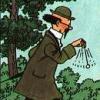-
Posts
269 -
Joined
-
Last visited
Reputation Activity
-
 thedig13 reacted to SK904 in Some questions about PhD program in History.
thedig13 reacted to SK904 in Some questions about PhD program in History.
@pudewen:
2. No I don't, but one of my family members told me about this after hearing it from the person first hand.
3. Ok thanks. What determines whether someone doesn't have to teach at all, every term, or in between? Teaching is something that I would rather not do. I also heard that PhD have to go to classes too? How much time does that take? I would really want an environment where i can just read and write all day, and would rather have nothing to do with classes.
3.1 Another thing is I read somewhere that in PhD you don't really have freedom to study whatever you want because if what you want to study is too much of a niche field and is something that not a lot of people take interest in, you would have hard time getting a job as a professor or getting a tenure and that you have to go with the flow of the field and so you have to write about the hot topics in your field?
4. So for PhD they don't look at the prestige of your school?
5. How much do consulting firms pay to recruit history PhDs? Do they also recruit other humanities PhDs?
6. What would it take to publish in top journals? Do you need to be already an excellent student? Or do they just see the quality of your writing itself and if it's good enough they might let you publish in their journals?
7. How could I get better access to archives and libraries while being a non-student?
-
 thedig13 reacted to pudewen in Some questions about PhD program in History.
thedig13 reacted to pudewen in Some questions about PhD program in History.
People have tried to explain this to you, but you seem to refuse to get it. I'll give it one more go, but it looks hopeless. Anyway, taking your questions one at a time:
1. NO LEGITIMATE PHD PROGRAM WILL ACCEPT YOU WITH A 2.8 GPA. It does not matter if you "do some independent studies in the field," as people with good GPAs who want to go to PhD programs have also done independent research; it's required, not an extra perk.
2. NO LEGITIMATE PHD PROGRAM IN ANY FIELD WILL ACCEPT YOU WITH A 2.8 GPA. It's possibile that you can find a PhD program in some field that will accept you, but it will probably be unaccredited, an online degree program, or both. And in that case, it's not worth your time.
3. IT DOESN'T MATTER, BECAUSE NO TOP UNIVERSITY WILL EVEN CONSIDER ADMITTING YOU. Why would any university want to spend over $100,000 on stipend money (never mind the free tuition) on someone who couldn't even manage a B average as an undergrad?
Takeaway message: it's vaguely conceivable that if you really want to do a PhD, and are committed to entirely revamping the approach to your studies that you've taken so far, that it could be worthwhile for you to try to get in to a Master's program (to even do that, you'll need to do seriously good work for the rest of this year, and impress your recommenders enough that they will be willing to stand up for you despite your poor academic record). If you do very well there, you could then be admitted to a PhD program. But as everyone has been telling you, at the moment, given your current record, you have absolutely no chance at admission to a legitimate, respectable, PhD program, even a lower-tier one.
-
 thedig13 reacted to CageFree in Some questions about PhD program in History.
thedig13 reacted to CageFree in Some questions about PhD program in History.
It's just like those students I used to have when I was a teacher, who did nothing all semester, then at the end came up and asked for extra credit projects to get their grade back up so they could "pass."
-
 thedig13 got a reaction from virmundi in Advice for Fall 2014 Student
thedig13 got a reaction from virmundi in Advice for Fall 2014 Student
I didn't know you were U.S. History -- your post didn't specify region. However, now that I've been enlightened, I would urge you to pick up Spanish. While it is true that U.S. historians aren't expected to have transcendant language proficiency, I'm going to parrot what CageFree said: Keep in mind that, within Hispanic-American communities, English isn't always the primary language, and Spanish is an integral part of daily life. Additionally, having a number of languages might give you a critical edge in the applications process.
I'd advise you to take your coursework at the college level; if not, I've been told that Rosetta Stone is the way to go. If you can, find an excuse to spend a month or two overseas, do it. Immersion does wonders for your language proficiency.
-
 thedig13 got a reaction from aec09g in Some questions about PhD program in History.
thedig13 got a reaction from aec09g in Some questions about PhD program in History.
SK903 --
To be frank, given the sorts of questions and responses you've posted on this thread so far, it seems as though you're not especially familiar with what graduate school is all about and what people do at the graduate level.
Outside of your GPA and your academic year, you've given us very little information about your strengths and weaknesses as an academic prospect. We can only give you good advice if you give us a good idea of what else you bring to the table, but questions intended to give us a better picture of who you are (i.e.: your GPA within History, why you have such a low GPA, whether or not you have a Thesis project lined up) have gone largely unanswered; instead, your responses have been unhelpful inquiries about online blogs and how you can avoid getting the Master's degree that your application seems to desperately need.
As much as I hate to be rude or presumptuous, given how bad your History GPA is and the nature of your responses, I'm going to have to conclude that you just didn't give a lot of serious effort throughout your undergraduate education, but now, as you finish out your last few academic semesters, faced with questions about what your job prospects are post-college, you assume that a fully-funded graduate program is a convenient solution to all of your problems and concerns. If you're serious about graduate school, you should start by reflecting on why your academic career has been so dreadful up to this point, networking with professors and learning more about what they do professionally, and working to make yourself better-informed as to what graduate school is all about.
Take this comment, for instance. An overwhelming majority of serious applicants to a History PhD program will have a 20-page primary-source-based research paper ready by application-season, and, among these, many will have even published articles in academic journals. With a 3.0 GPA and an amateur online blog, how do you intend to stack up against a student with a 3.75 GPA and multiple articles in proper academic publications? It's like bringing a thumb-tack to a sword-fight. That's not to mention the importance of foreign-language training, networking with professors at your institution, networking with professors at other schools, and developing refined, in-depth interests focusing on one or two distinct fields of history.
-
 thedig13 got a reaction from runaway in Some questions about PhD program in History.
thedig13 got a reaction from runaway in Some questions about PhD program in History.
SK903 --
To be frank, given the sorts of questions and responses you've posted on this thread so far, it seems as though you're not especially familiar with what graduate school is all about and what people do at the graduate level.
Outside of your GPA and your academic year, you've given us very little information about your strengths and weaknesses as an academic prospect. We can only give you good advice if you give us a good idea of what else you bring to the table, but questions intended to give us a better picture of who you are (i.e.: your GPA within History, why you have such a low GPA, whether or not you have a Thesis project lined up) have gone largely unanswered; instead, your responses have been unhelpful inquiries about online blogs and how you can avoid getting the Master's degree that your application seems to desperately need.
As much as I hate to be rude or presumptuous, given how bad your History GPA is and the nature of your responses, I'm going to have to conclude that you just didn't give a lot of serious effort throughout your undergraduate education, but now, as you finish out your last few academic semesters, faced with questions about what your job prospects are post-college, you assume that a fully-funded graduate program is a convenient solution to all of your problems and concerns. If you're serious about graduate school, you should start by reflecting on why your academic career has been so dreadful up to this point, networking with professors and learning more about what they do professionally, and working to make yourself better-informed as to what graduate school is all about.
Take this comment, for instance. An overwhelming majority of serious applicants to a History PhD program will have a 20-page primary-source-based research paper ready by application-season, and, among these, many will have even published articles in academic journals. With a 3.0 GPA and an amateur online blog, how do you intend to stack up against a student with a 3.75 GPA and multiple articles in proper academic publications? It's like bringing a thumb-tack to a sword-fight. That's not to mention the importance of foreign-language training, networking with professors at your institution, networking with professors at other schools, and developing refined, in-depth interests focusing on one or two distinct fields of history.
-
 thedig13 got a reaction from CageFree in Some questions about PhD program in History.
thedig13 got a reaction from CageFree in Some questions about PhD program in History.
SK903 --
To be frank, given the sorts of questions and responses you've posted on this thread so far, it seems as though you're not especially familiar with what graduate school is all about and what people do at the graduate level.
Outside of your GPA and your academic year, you've given us very little information about your strengths and weaknesses as an academic prospect. We can only give you good advice if you give us a good idea of what else you bring to the table, but questions intended to give us a better picture of who you are (i.e.: your GPA within History, why you have such a low GPA, whether or not you have a Thesis project lined up) have gone largely unanswered; instead, your responses have been unhelpful inquiries about online blogs and how you can avoid getting the Master's degree that your application seems to desperately need.
As much as I hate to be rude or presumptuous, given how bad your History GPA is and the nature of your responses, I'm going to have to conclude that you just didn't give a lot of serious effort throughout your undergraduate education, but now, as you finish out your last few academic semesters, faced with questions about what your job prospects are post-college, you assume that a fully-funded graduate program is a convenient solution to all of your problems and concerns. If you're serious about graduate school, you should start by reflecting on why your academic career has been so dreadful up to this point, networking with professors and learning more about what they do professionally, and working to make yourself better-informed as to what graduate school is all about.
Take this comment, for instance. An overwhelming majority of serious applicants to a History PhD program will have a 20-page primary-source-based research paper ready by application-season, and, among these, many will have even published articles in academic journals. With a 3.0 GPA and an amateur online blog, how do you intend to stack up against a student with a 3.75 GPA and multiple articles in proper academic publications? It's like bringing a thumb-tack to a sword-fight. That's not to mention the importance of foreign-language training, networking with professors at your institution, networking with professors at other schools, and developing refined, in-depth interests focusing on one or two distinct fields of history.
-
 thedig13 got a reaction from New England Nat in Some questions about PhD program in History.
thedig13 got a reaction from New England Nat in Some questions about PhD program in History.
SK903 --
To be frank, given the sorts of questions and responses you've posted on this thread so far, it seems as though you're not especially familiar with what graduate school is all about and what people do at the graduate level.
Outside of your GPA and your academic year, you've given us very little information about your strengths and weaknesses as an academic prospect. We can only give you good advice if you give us a good idea of what else you bring to the table, but questions intended to give us a better picture of who you are (i.e.: your GPA within History, why you have such a low GPA, whether or not you have a Thesis project lined up) have gone largely unanswered; instead, your responses have been unhelpful inquiries about online blogs and how you can avoid getting the Master's degree that your application seems to desperately need.
As much as I hate to be rude or presumptuous, given how bad your History GPA is and the nature of your responses, I'm going to have to conclude that you just didn't give a lot of serious effort throughout your undergraduate education, but now, as you finish out your last few academic semesters, faced with questions about what your job prospects are post-college, you assume that a fully-funded graduate program is a convenient solution to all of your problems and concerns. If you're serious about graduate school, you should start by reflecting on why your academic career has been so dreadful up to this point, networking with professors and learning more about what they do professionally, and working to make yourself better-informed as to what graduate school is all about.
Take this comment, for instance. An overwhelming majority of serious applicants to a History PhD program will have a 20-page primary-source-based research paper ready by application-season, and, among these, many will have even published articles in academic journals. With a 3.0 GPA and an amateur online blog, how do you intend to stack up against a student with a 3.75 GPA and multiple articles in proper academic publications? It's like bringing a thumb-tack to a sword-fight. That's not to mention the importance of foreign-language training, networking with professors at your institution, networking with professors at other schools, and developing refined, in-depth interests focusing on one or two distinct fields of history.
-
 thedig13 got a reaction from Riotbeard in Some questions about PhD program in History.
thedig13 got a reaction from Riotbeard in Some questions about PhD program in History.
SK903 --
To be frank, given the sorts of questions and responses you've posted on this thread so far, it seems as though you're not especially familiar with what graduate school is all about and what people do at the graduate level.
Outside of your GPA and your academic year, you've given us very little information about your strengths and weaknesses as an academic prospect. We can only give you good advice if you give us a good idea of what else you bring to the table, but questions intended to give us a better picture of who you are (i.e.: your GPA within History, why you have such a low GPA, whether or not you have a Thesis project lined up) have gone largely unanswered; instead, your responses have been unhelpful inquiries about online blogs and how you can avoid getting the Master's degree that your application seems to desperately need.
As much as I hate to be rude or presumptuous, given how bad your History GPA is and the nature of your responses, I'm going to have to conclude that you just didn't give a lot of serious effort throughout your undergraduate education, but now, as you finish out your last few academic semesters, faced with questions about what your job prospects are post-college, you assume that a fully-funded graduate program is a convenient solution to all of your problems and concerns. If you're serious about graduate school, you should start by reflecting on why your academic career has been so dreadful up to this point, networking with professors and learning more about what they do professionally, and working to make yourself better-informed as to what graduate school is all about.
Take this comment, for instance. An overwhelming majority of serious applicants to a History PhD program will have a 20-page primary-source-based research paper ready by application-season, and, among these, many will have even published articles in academic journals. With a 3.0 GPA and an amateur online blog, how do you intend to stack up against a student with a 3.75 GPA and multiple articles in proper academic publications? It's like bringing a thumb-tack to a sword-fight. That's not to mention the importance of foreign-language training, networking with professors at your institution, networking with professors at other schools, and developing refined, in-depth interests focusing on one or two distinct fields of history.
-

-
 thedig13 reacted to SK904 in Some questions about PhD program in History.
thedig13 reacted to SK904 in Some questions about PhD program in History.
If you create a blog or website with contents about the topics of your interest that catches the eyes of certain professor could that trump bad GPA and make possible getting into a good PhD program with low GPA? Even if you do have a bad GPA could they might see passion and ingenuity on your blog?
-
 thedig13 reacted to New England Nat in Some questions about PhD program in History.
thedig13 reacted to New England Nat in Some questions about PhD program in History.
We've all been dancing around it. It's not iffy. It's fraud. One should not commit fraud and expect another institution to want anything to do with you. If you have a consoluation masters you can guarrentee people will contact that old department. Unless you had outside reasons for leaving the program they will be suspicious.
-
 thedig13 got a reaction from runaway in Advice on Realistic Schools
thedig13 got a reaction from runaway in Advice on Realistic Schools
While I don't want to say anything about your advisor, I will say that you seem to underestimate the importance of foreign language mastery. It's certainly true that Americanists tend to have more lax language-expectations than those in other fields, but I'd urge you to approach languages as an integral part of professional history rather than some droll, boring chore that needs to be completed before you're allowed to go outside and play. Even for an Americanist, knowing languages opens a vast multitude of doors and puts you at a massive advantage in terms of where you'll be able to take your research. For instance, if you become interested in the LA Riots of 1992, you might need to pick up some Korean. Californian immigrant history? Probably Spanish, Chinese, and Japanese, for starters. This is why there is a language requirement at all -- while you may not be interested in this material now, if there may be some unforeseen time in the future where not knowing a certain language puts a promising research project to a grinding halt.
Also, I'd urge you to really start thinking about what, specifically, you're interested in studying. The fact that you're "probably going to look at studying American History (or some type of similar major)" is a bit worrying. You need to really, really start refining your fields. Most people who are admitted into history programs have a fairly specific, well-refined idea of what really fascinates them. Obviously, you shouldn't be so hard-and-set on a particular topic that you become narrow-minded and stubborn about expanding/developing your interests, but, at the same time, a prospect who can say "I'm interested in the health and sanitation problems which developed from 19th-century urbanization in the Northern US" has a massive advantage over somebody who can only define their interests as "19th-century American history." Additionally, if you really start to refine your interests, you can start narrowing down potential advisors (and, by extension, potential schools), and you'll also be able to write a far more impressive and convincing SOP.
And, of course, these two factors (languages and specific interests) can go hand-in-hand, which is another reason why you should really start thinking about your interests in more specific terms. An Americanist who wants to write a dissertation on 1890s imperialism and another who's interested in the 1920s Red Scare probably shouldn't have identical linguistic repertoires. If you master Spanish but eventually become enamored with a dissertation-topic that requires Russian, you'll need to start from square one with Russian; but, if you have a more specific idea of what you want to study, you'll have a more specific idea of what foreign languages would be best for you, and a better chance of avoiding these sorts of situations.
-
 thedig13 reacted to Simple Twist of Fate in Advice on Realistic Schools
thedig13 reacted to Simple Twist of Fate in Advice on Realistic Schools
I don't mean to harp, but I wonder how much time you've spent in midwestern college towns? I can't speak for the south, as I've never lived there myself, but there are many very liberal (I'm guessing you're not avoiding the south because it is too liberal, hence my inference) colleges and towns in the midwest. Bloomington, Champaign, Evanston, Ann Arbor, Chicago, Madison, Louisville, etc are all known to be very liberal and accepting places, for example. I would also suggest that if you're serious about working in academia, then you may ultimately end up living and working in a place you're less than thrilled about (at least initially). Again, I would suggest you apply to all programs you fit well with, and if a midwestern/southern university accepts you, go visit! Maybe you'll find that life in between the coasts really isn't so horrible (it's not).
Additionally, consider the possibility that in grad school, you probably won't have either the time or money to really enjoy an exciting locale. In fact, living in a great city like Boston has its disadvantages for a grad student - namely cost of living and numerous distractions.
-
 thedig13 got a reaction from Sigaba in An Article Criticizing Grad Cafe
thedig13 got a reaction from Sigaba in An Article Criticizing Grad Cafe
I find it amusing and dismissable because it centers around an assumption that most young students at TGC choose grad school to "avoid" the job market and somehow escape the responsibilities of adulthood. The writer's main critique of TGC seems to be that it "is puncturing [her alter-ego's] illusions about what grad school could represent for a young adult eager to take a time-out from the neurotic competitiveness of real life." Maybe I haven't spent enough time outside of the History forums, but I think that most at TGC (especially the veterans and frequent posters) have chosen to consider/attend graduate school because they genuinely love their discipline and/or are serious about pursuing a career in academia. Most of us (at least within the History forum, and maybe the Humanities and Social Sciences in general) have made an informed, independent, and conscious decision to devote ourselves to a discipline that is dramatically under-appreciated within society. We've made a deliberate decision to pursue a career path where the job market is absolute shit, the salaries are meager, the benefits are (often) nonexistent, the lifestyle is hectic, unstable, and unpredictable, and those who are employed are overworked into the dirt. We're not starry-eyed idiots trying to live up to some misinformed and hyper-romanticized illusion of what life of mind is like. We do it because we love it, but we know that it's not going to be pretty and we have no illusions about it.
If somebody's applying for grad school because they're scared of a bad job market or because they want to avoid the so-called "real world" (a term I despise, since it's not like undergrads and high schoolers exist in some alternate reality devoid of responsibilities, stresses, and problems), then he/she was in for a rude awakening sooner or later.
-
 thedig13 got a reaction from Sigaba in Fields?
thedig13 got a reaction from Sigaba in Fields?
American History
R_Escobar (20th century, American Indian),
crazedandinfused (antebellum, intellectual),
hopin'-n-prayin' (southern, religious),
stevemcn (transnational),
Simple Twist of Fate (early American),
zb642 (20th century, labor/working-class culture),
BCEmory08 (19th-20th century Catholicism, labor),
irvinchiva10 (20th century, immigration/immigration reform)
natsteel (early American political culture and intellectual history)
unforth (19th century US political and military history, US Civil War)
hbeels (colonial, early national, 19th century, transappalachain west, historical memory of these eras/areas)
thedig13 (20th century U.S., culture and protest, African-American)
European HistoryKelkel (Modern Germany, political),
goldielocks (Britain),
SapperDaddy (Eastern and Central Europe),
kotov (Modern Romania, Holocaust, labor),
RevolutionBlues (Modern Western Europe/France labor and leftist politics),
theregalrenegade (18th/19th cent British Empire/environment),
jrah822 (19th century Britain; emphasis on colonial relationship to India),
grlu0701 (Intellectual & cultural history,fin de siecle Germany and Italy),
naturalog (modern European [mostly German] intellectual and cultural/sexuality and gender/political radicalism),
runaway (Eastern/Central, memorialization & visual culture),
Sequi001 (Modern France, gender and sexuality, colonialism/imperialism)
Abetheh (19th/early 20th century Germany and France, religious politics vs secularization)
African HistoryOseirus (precolonial/early colonial West Africa),
Singwaya18 (20th century East Africa),
Safferz (20th century Horn/Northeast Africa),
The People's Scholar (Spanish colonialim in Africa- i.e. middle/West Africa)
Jogatoronto (Psychiatry in early colonial West Africa)
Latin American HistoryCageFree (20th century, Southern Cone),
BH-history,
The People's Scholar (18th-19th century Colombia)
StrangeLight (20th century Central America)
East Asian Historyalleykat (Modern China)
kyjin (Pre-Modern Japan)
Near/Middle Eastern Historyuhohlemonster, (modern Israel, Iran, Palestine)
oswic (modern Egypt, gender)
Atlantic Worldsandyvanb
crazedandinfused
Global/World History
[*]cooperstreet (Cold War)
Jewish History
[*]uhohlemonster, (modern Israel)
[*]hopin'-n-'prayin,
[*]kotov (Holocaust),
[*]naturalog (sometimes modern European/Holocaust),
[*]runaway (memorialization & visual culture),
[*]ticklemepink (20th c. Germany/U.S)
Science/Technology/Environment
[*]shaxmaty1848 (Cold War)
[*]StrangeLight (environmental history, ecological distribution conflicts)
Social
[*]annieca (Cold War and Post-Cold War East and Central Europe)
Classical and Medieval
[*]Hogs of War (Monastic Studies and Conflicts in Authority)
Cultural
[*]StrangeLight (gender, race, ethnicity, and religion)
[*]hbeels (race/ethnicity, religious, masculinity/feminimity, print/literature)
[*]crazedandinfused (race, nationalism, performance, rhetoric)
[*]alleykat (religion, race/ethnicity, cultural relativism)
-
 thedig13 got a reaction from crazedandinfused in An Article Criticizing Grad Cafe
thedig13 got a reaction from crazedandinfused in An Article Criticizing Grad Cafe
I find it amusing and dismissable because it centers around an assumption that most young students at TGC choose grad school to "avoid" the job market and somehow escape the responsibilities of adulthood. The writer's main critique of TGC seems to be that it "is puncturing [her alter-ego's] illusions about what grad school could represent for a young adult eager to take a time-out from the neurotic competitiveness of real life." Maybe I haven't spent enough time outside of the History forums, but I think that most at TGC (especially the veterans and frequent posters) have chosen to consider/attend graduate school because they genuinely love their discipline and/or are serious about pursuing a career in academia. Most of us (at least within the History forum, and maybe the Humanities and Social Sciences in general) have made an informed, independent, and conscious decision to devote ourselves to a discipline that is dramatically under-appreciated within society. We've made a deliberate decision to pursue a career path where the job market is absolute shit, the salaries are meager, the benefits are (often) nonexistent, the lifestyle is hectic, unstable, and unpredictable, and those who are employed are overworked into the dirt. We're not starry-eyed idiots trying to live up to some misinformed and hyper-romanticized illusion of what life of mind is like. We do it because we love it, but we know that it's not going to be pretty and we have no illusions about it.
If somebody's applying for grad school because they're scared of a bad job market or because they want to avoid the so-called "real world" (a term I despise, since it's not like undergrads and high schoolers exist in some alternate reality devoid of responsibilities, stresses, and problems), then he/she was in for a rude awakening sooner or later.
-
 thedig13 reacted to New England Nat in Have a BS in Psychology but considering pursuing my passion for history... help!
thedig13 reacted to New England Nat in Have a BS in Psychology but considering pursuing my passion for history... help!
I'm going to agree with all of thedig's recommendations about a masters, so consider those seconded.
I would also assure you that a lot of undergraduate history majors discover that graduate level history is a very different thing than what they did even in their upper level undergraduate classes. I'm not a huge fan of this book as light reading, but you should take a glance through Peter Novak's That Noble Dream: The 'Objectivity Question' and the American Historical Profession. It ends in a moment 20 years ago that is very particular, but it is an excellent introduction to the way in which the historical profession changes over time.
-
 thedig13 reacted to Professor Plum in Sh^t People Say About (History) Graduate School
thedig13 reacted to Professor Plum in Sh^t People Say About (History) Graduate School
...and in the bad old days before word processors, it was not uncommon for the acknowlegments in a first book to read "Thanks to Catherine, who typed and edited the manuscript. The biggest thanks go to my lovely wife Elaine, whose support sustained me through the arduous process of research, writing, and advising...." Followed, of course, by acknowledgments in the second book beginning with "To my lovely wife Catherine...."
-
 thedig13 got a reaction from oseirus in Languages We Know
thedig13 got a reaction from oseirus in Languages We Know
I am thedig13, and I approve of this message.
-
 thedig13 got a reaction from theregalrenegade in Languages We Know
thedig13 got a reaction from theregalrenegade in Languages We Know
I am thedig13, and I approve of this message.
-
 thedig13 got a reaction from crazygirl2012 in Accepted Early to a backup school -- Best way to handle it?
thedig13 got a reaction from crazygirl2012 in Accepted Early to a backup school -- Best way to handle it?
I second what svh said. There's no need to feel pressured for an answer, but the worst thing you can do is simply not respond. Just indicate that you've received their offer of admission and really appreciate it, but haven't made a finalized decision yet.
If you eventually decide to go somewhere else, just be professional about it, thank them for the offer, and respectfully decline.
-
 thedig13 got a reaction from omahairish in For fun/stress relief: History Trivia Game
thedig13 got a reaction from omahairish in For fun/stress relief: History Trivia Game
Just a quick question -- later in the 1500s, when Protestantism emerged, the (spiritual) descendants of these Roman "Christians" became "Catholics," and, today, usage of "Christianity" implies "Protestant". Wouldn't it be more proper/accurate, then, to refer to the Ancient Romans of the time as Catholics (especially as the descendants of these Roman "Christians" are now known as the "Roman Catholic Church")? Or is there some reason we refer to the Romans as "Christian" when, in fact, the modern "Catholic" can trace his spirital/religious roots to the Roman, which is something that the Protestant-Christian can't do in the same manner?
Just wondering.
-
 thedig13 got a reaction from virmundi in For fun/stress relief: History Trivia Game
thedig13 got a reaction from virmundi in For fun/stress relief: History Trivia Game
Matt Damon grew up living next to iconic historian and social critic Howard Zinn in Boston. Zinn served as a community leader in the area, and a grandfather-esque figure to Damon.
Later, when Damon wrote the screenplay to Good Will Hunting, he included a shout-out to Howard Zinn in the dialogue. Thus, in the movie, when Damon's character chats with Robin Williams' character about a collection of books, Damon says something along the lines of "You want to read a fucking history book? Read Howard Zinn's A People's History of the United States. That book will knock you on your ass."
-
 thedig13 got a reaction from goldielocks in For fun/stress relief: History Trivia Game
thedig13 got a reaction from goldielocks in For fun/stress relief: History Trivia Game
Matt Damon grew up living next to iconic historian and social critic Howard Zinn in Boston. Zinn served as a community leader in the area, and a grandfather-esque figure to Damon.
Later, when Damon wrote the screenplay to Good Will Hunting, he included a shout-out to Howard Zinn in the dialogue. Thus, in the movie, when Damon's character chats with Robin Williams' character about a collection of books, Damon says something along the lines of "You want to read a fucking history book? Read Howard Zinn's A People's History of the United States. That book will knock you on your ass."













